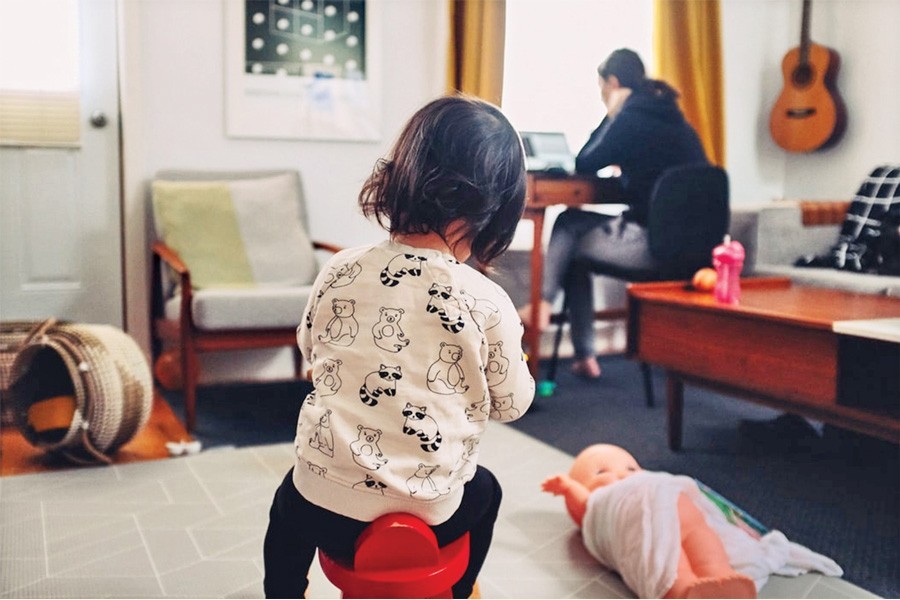
Published :
Updated :

The pandemic has brought with it numerous changes in daily life. The changed pattern of daily life is now called the ‘new normal.’ And the new normal has a new work-life phenomenon called ‘Work From Home’ (WFH).
This work from home model is something almost every white-collar employee have experienced, at least the ones who were fortunate to retain their jobs through the pandemic. Despite bringing significant benefits such as the avoidance of time-consuming commutes, the work from home setting is far from utopian. In order to get a holistic idea of the experience of sustained remote working, the outlooks of some professionals are put forward.
Ehsanul Karim Chowdhury, an analyst at Riverstone Capital Limited shared, “The most difficult part of working from home for me was to separate my work life from my personal life. You feel like your working hours is all day long since you are basically working and sleeping in the same room. I struggled with compartmentalising my work-life initially due to this.”
Given how the continued spell of lockdowns withstood, people were confined in their living spaces for the greater part of Covid-19, and evidently, for professionals, this creates the impression of living at work.
Mr Karim suggested creating a separate workspace to help in this case but added that it will not be possible for most people. Also, he mentions missing those small mental breaks and coffee hangouts with colleagues.
“I used to go for coffee during breaks with my colleagues and these informal coffee sessions were really fun and informative. But in working from home, it just works without the fun part.”
Tahmid Rakib, an assistant in audit and advisory services at KPMG Bangladesh, also eches the lack of social interactions. However, for him, it is not a haze between his work and personal life that formed the root cause of WFH stress.
“For me, the stress of work from home has largely been due to the absence of the social aspects of the office. I feel that heavy workload and tight deadlines were more manageable when they were mixed with fun conversations with your colleagues.”
Despite having more time in hand, the continued work hours without any scope of in-person interactions with colleagues can increase the difficulty of meeting deadlines regardless of the increased amount of time available. Online platforms may allow room for smooth collaboration, but do not give a proper avenue to share stress with colleagues, potentially increasing anxiety levels within employees and adversely impacting productivity. The sense of working alone creeps onto seasoned professionals due to sustained remote working.
For some, WFH can bring a completely different effect from work-life diffusion or added stress. Mita Somoyeeta, a financial analyst at SureCash, misses going to the office and interacting and talking to her colleagues, gossiping with them during lunch.
“It (WFH) contributes to becoming lazy and I can't approach my work with a similar enthusiasm as before. Sometimes I also get distracted by the surroundings of my home.”
Decreased motivation levels are a natural consequence of WFH and it stems from the same root of most other problems surrounding remote working, that is the absence of social interactions. The leeway of not being watched by colleagues may also lead to procrastination.
To make WFH more bearable for employees and maximise productivity from employees, organisations need to step up. Adnan Hossain Tushar, a territory manager at Unilever, recommended the same. He thinks, “Now is a crucial time for companies to focus on work-life balance more than ever as this will certainly build loyalty and develop long-lasting commitment.”
Organisations invest significantly to enhance their employer brand, device training programmes, provide fringe benefits among other things, to attract and retain suitable talent. Organisations will receive an implicit form of loyalty from employees they protect during this rough phase.
And that is not just limited to preventing layoffs, it extends to ensuring that company staff can navigate through their jobs during the pandemic being physically and mentally well. Ensuring this or extending significant efforts in this endeavour will most likely be a central reason for the loyalty among several employees.


 For all latest news, follow The Financial Express Google News channel.
For all latest news, follow The Financial Express Google News channel.